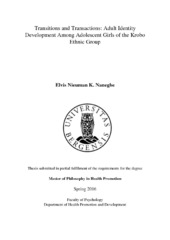| dc.description.abstract | Introduction: Transition to adulthood in the Krobo ethnic group has been through the dipo rites of passage. Over the years, social transformation has influenced the rite and the outcome adult identity of dipo girls. A considerable amount of literature has been published on dipo and its suggestive potentials in preventing sexual and reproductive vulnerabilities. Studies, however, have not explored self-definitions of adolescent girls. More recent studies focusing on adult identity development have been carried out on role transitions and personal qualities. Such approaches, however, have failed to capture the understanding of culturally prescribed pathways to adult identity development. Using the Salutogenic theory, this qualitative study explored adult identity development of adolescent Krobo girls through the dipo rites of passage by exploring; adult perspective on cultural markers to adulthood, adolescents' perception of adulthood and whether going through the rites, adolescent dipo girls exert control over their sexual and reproductive health. Methodology: An ethnographic method of enquiry was used in the conduct of the study in Krobo Odumase. A total of 23 participants were purposively recruited for the study through a gatekeeper. Participants include ten adolescent girls between the ages of 12 and 18, ten parents, and three traditional leaders. Data were generated through Photovoice, semi structured in-depth interviews, focus group discussions, and observations. All interactions were held in the Damgbe language and interpreted into the English language, transcribed and analysed using Attride- Stirling (2001) thematic network analysis and Open code. Findings and discussion; Key findings from the study showed that the dipo puberty rite is a cultural means through which adolescent girls are socialized into womanhood and assume the ethnic identity of a Krobo woman" to which adult identity is linked. However, the transition of the culture through contact with Christianity and formal education has extended liminality of initiates since girls are no more recognised officially as adults after the dipo rite. Also, most adolescent girls' subjective sense of adult identity is diffused. Most girls consider themselves as neither adults nor children but felt in-between given parental limitation on autonomy. Given the shorter duration of the rite and early onset of puberty, traditional sanctions on sexual behavior are broken and do not facilitate control after the rites. Most parents expressed worry as dipo girls are sexually active in the community. Markers to adulthood identified were mostly role transitions; becoming a parent, getting married and giving birth. Although individual markers, taking responsibility and maturity were identified, their influence was associated with role transition markers. Further, contextual transactions showed that peer and family were most Page | viii influential in adolescent identity development and behavior regulation. The quality of parentchild relationship influenced adolescent behavior regulation through reflected appraisal and negative peer association control by parents. However, most parents are overwhelmed by adolescent misbehavior which may stem from autonomy needs. Also, the dipo rite and parental agency provided means through which the female gender identity is intensified through con-tinuous gender role socialization at home after the rite, and control of negative peer affiliation of their children. Sexual communication was found to be silent in the culture, limited and uni-directional without the active engagement of adolescent girls. Although some parents are able to engage their children, most parents find it difficult discussing sexual topics. Sexual educa-tion during the dipo rites is not explicit and seemingly not existent. Implications of the findings indicate that lack of recognition of dipo girls and parental misun-derstanding of the developmental stage of their children may lead to behavior problems and detachment from parents. Also, the near silence of sexual communication in the community may influence negative sexual and reproductive health outcomes such as pregnancy and sexually transmitted diseases in the community. Conclusion: The dipo in current times does not facilitate control over adolescent sexual attitudes after the rite. The cultural failure resulting from associated influence of early onset of puberty and reduction of the age of initiation does not promote gains in adolescent sexual and reproductive health as dipo. Also, though the rite has transitioned to provide alternative means of recognition as an adult, it is practically valued as fundamental towards transitioning to adult-hood in the Krobo culture. However, cultureinfluenced dipo girls’ perceptions about adulthood to informed by demographic markers or role transitions mostly. Although personal qualities were observed, their influence complement role transitions and these have greatly influenced the subjective sense of adult identity achievement among dipo girls. | en_US |
